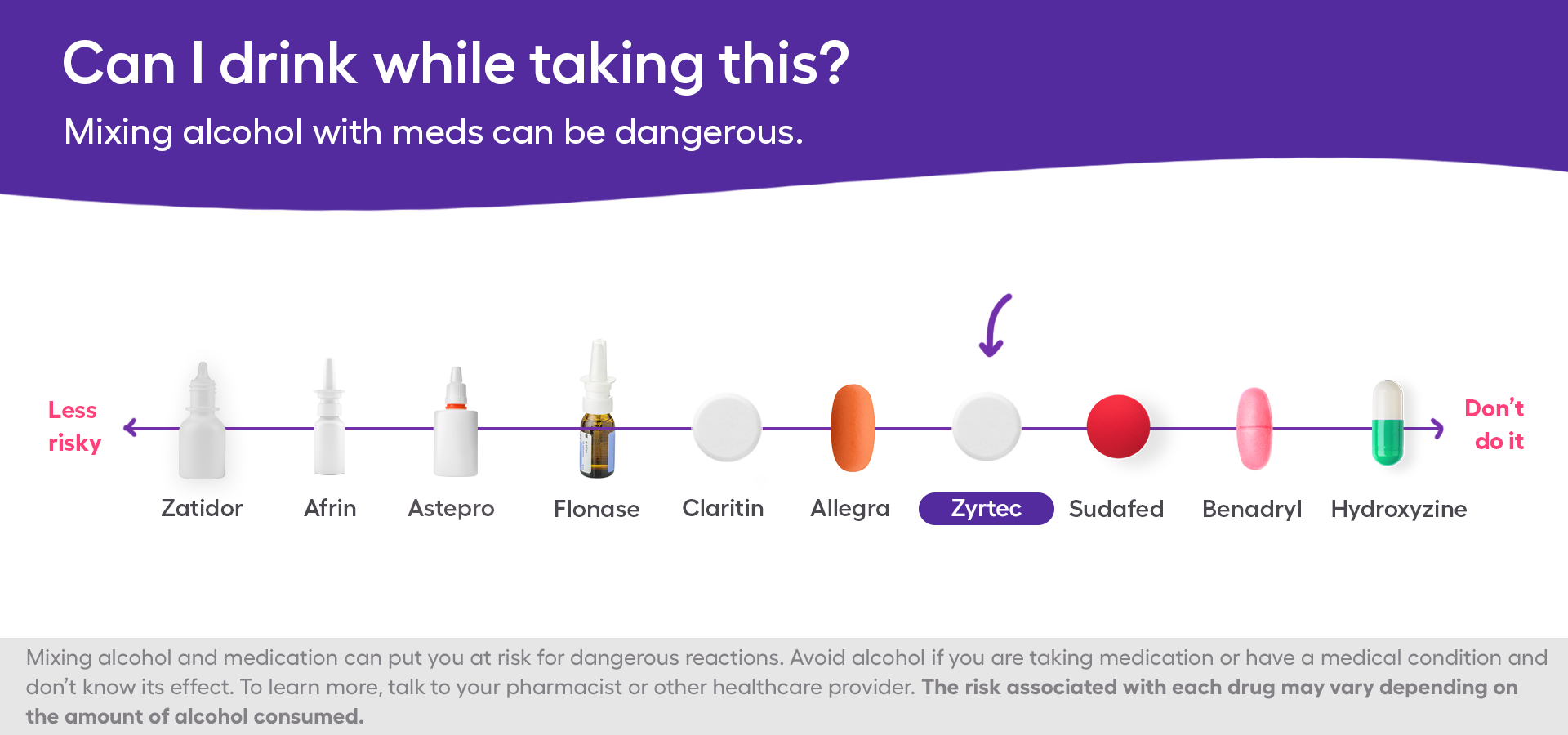Key takeaways
Combining Zyrtec with alcohol can make you sleepy and affect your ability to think clearly.
It’s generally recommended to wait at least two days after taking Zyrtec before consuming alcohol.
Alternatives like nasal sprays or eye drops may be safer with alcohol, as they don’t typically cause drowsiness.
You took your morning Zyrtec dose to manage pesky allergy symptoms, only to remember you’re supposed to go wine tasting later. This situation raises an important question: can you safely mix Zyrtec and alcohol without adverse effects? It’s a common scenario for many and worth exploring how allergy medications and alcohol interact.
Generally, mixing Zyrtec and alcohol is not recommended without a healthcare provider’s guidance. While some people might tolerate light drinking, combining the two may intensify drowsiness and impair judgment. You may want to look into these risks so you can make the right decisions about your health and well-being.
Can you drink alcohol with Zyrtec?
Zyrtec (cetirizine) is an antihistamine medication used to treat allergy symptoms such as sneezing, a runny nose, and watery eyes. It’s effective for conditions like hay fever (allergic rhinitis) and hives.
Mixing alcohol with Zyrtec is generally not recommended. Both alcohol and Zyrtec are central nervous system (CNS) depressants, which means they can slow down brain activity. This combination may lead to increased drowsiness, dizziness, and impaired cognitive function.
Since Zyrtec can have different effects on individuals, it’s a good idea to wait until you understand how it affects you before deciding whether it’s safe to drink. Consuming large amounts of alcohol while taking Zyrtec can lead to a higher risk of side effects than smaller, less frequent amounts.
In some cases, healthcare providers might allow moderate alcohol consumption with Zyrtec. Drinking in moderation typically means:
- Up to one drink per day for women
- Up to two drinks per day for men

The effects of mixing Zyrtec with alcohol
Combining Zyrtec and alcohol can lead to several adverse reactions. Both substances cause drowsiness or sleepiness. When taken together, their sedative effects can become stronger, leading to extreme drowsiness and an impaired ability to think or make decisions. Therefore, it can be dangerous to perform tasks that require attention, like driving, after mixing the two.
Zyrtec and alcohol may cause other side effects, including the following:
- Dizziness
- Headaches
- Nausea
- Vomiting
- Upset stomach
- Dry mouth
- Sweating or feeling hot
The severity of these side effects may vary by person. Some people may experience severe side effects, while others may experience mild and manageable ones.
The effects of pseudoephedrine in Zyrtec-D with alcohol
Zyrtec-D combines cetirizine with pseudoephedrine, a decongestant that may be risky when drinking alcohol. Pseudoephedrine is a stimulant that helps relieve nasal congestion, while alcohol is a depressant.
When taken together, pseudoephedrine and alcohol can create a tug-of-war effect in the body, as one tries to keep you alert while the other makes you drowsy. As a result, the combination may impair your ability to think clearly and react quickly, increasing the risk of accidents.
Both pseudoephedrine and alcohol can also affect your cardiovascular system. Alcohol may cause dehydration and can lead to increased heart rate and blood pressure. These effects of alcohol may be further amplified by pseudoephedrine. This combination may also increase side effects like dizziness and anxiety. For these reasons, it’s best to avoid drinking alcohol while using products that contain pseudoephedrine.
Always consult a healthcare provider for medical advice and to understand the potentially serious side effects involved.
How long after taking Zyrtec can I drink alcohol?
Cetirizine, the active ingredient in Zyrtec, has a half-life of around eight hours. The half-life of a drug is the time it takes for half of the drug to be eliminated from the body. Typically, it takes about four to five half-lives for a drug to be nearly cleared from your system.
Here is an example:
|
Time after last dose |
Amount of cetirizine remaining |
| 0 hours | 100% |
| 8 hours | 50% |
| 16 hours | 25% |
| 24 hours | 12.5% |
| 32 hours | 6.25% |
Therefore, it may take approximately 32 to 40 hours for Zyrtec to be mostly clear from your body. To play it safe, it is often recommended to wait at least two days after taking Zyrtec before drinking alcohol. Still, some people may feel the effects of antihistamines like Zyrtec for several days after their last dose.
Listen to your body and use caution to ensure that Zyrtec has fully left your system before consuming alcohol.
Alternatives to Zyrtec that may be safer with alcohol
If you plan on consuming alcohol but your allergies are acting up, several options may be safer to use.
Steroid nasal sprays
Steroid nasal sprays, such as Flonase (fluticasone) and Nasacort (triamcinolone), help reduce inflammation in the nasal passages. They work by blocking the release of substances that cause allergy symptoms. Because these sprays act locally and are not absorbed extensively into the bloodstream, they are less likely to cause drowsiness compared to oral antihistamines like Zyrtec.
Antihistamine nasal sprays
Astepro (azelastine) is an example of an antihistamine spray that targets allergy symptoms right where they happen—in the nose. This local action helps relieve sneezing and a runny nose without the drowsiness linked to oral allergy medicine like Zyrtec. Since azelastine is less absorbed into the bloodstream, it’s less likely to have an interaction with alcohol.
Decongestant nasal sprays
Decongestant nasal sprays, like Afrin (oxymetazoline), quickly relieve stuffy noses by narrowing blood vessels in the nasal area. This reduces swelling and helps you breathe better. Because these sprays work mainly in the nose and are not widely absorbed into your system, they are less likely to make you drowsy or interact with alcohol.
Eye drops
Zaditor (ketotifen) is an antihistamine eye drop that helps relieve watery, itchy eyes due to allergies without causing side effects throughout the body. Another option is Naphcon-A (naphazoline/pheniramine), which combines ingredients to reduce both redness and swelling in the eyes. Since these drops don’t cause drowsiness and work directly on the eyes, they are less likely to interact with alcohol.
These alternatives might be better as they often target symptoms locally and may not cross the blood-brain barrier. This reduces the risk of drowsiness and other side effects that can be worsened by alcohol consumption.
The bottom line
Mixing Zyrtec and alcohol can lead to increased drowsiness, dizziness, and impaired cognitive function. It is recommended to limit or avoid combining these substances due to the potential risks. Always consult a healthcare professional before combining medications with alcohol, especially if you have other medical conditions or take other medications. If you or a loved one have trouble with alcohol use or alcohol abuse, consider joining groups like Alcoholics Anonymous (AA) or seeking help from a licensed therapist. Addressing alcoholism may help reduce the risks of drug interactions with medications like Zyrtec and long-term health complications.
- Cetirizine switch to over-the-counter: Patient response and impact on treatment compliance, Journal of Allergy and Clinical Immunology (2010)
- Drinking levels and patterns defined, National Institute on Alcohol Abuse and Alcoholism (2024)
- Pseudoephedrine, MedlinePlus (2018)
- Mechanism of dehydration following alcohol ingestion, JAMA Internal Medicine (1963)
- Cetirizine, StatPearls (2024)
- Eye drops, American Academy of Allergy, Asthma & Immunology (2020)




